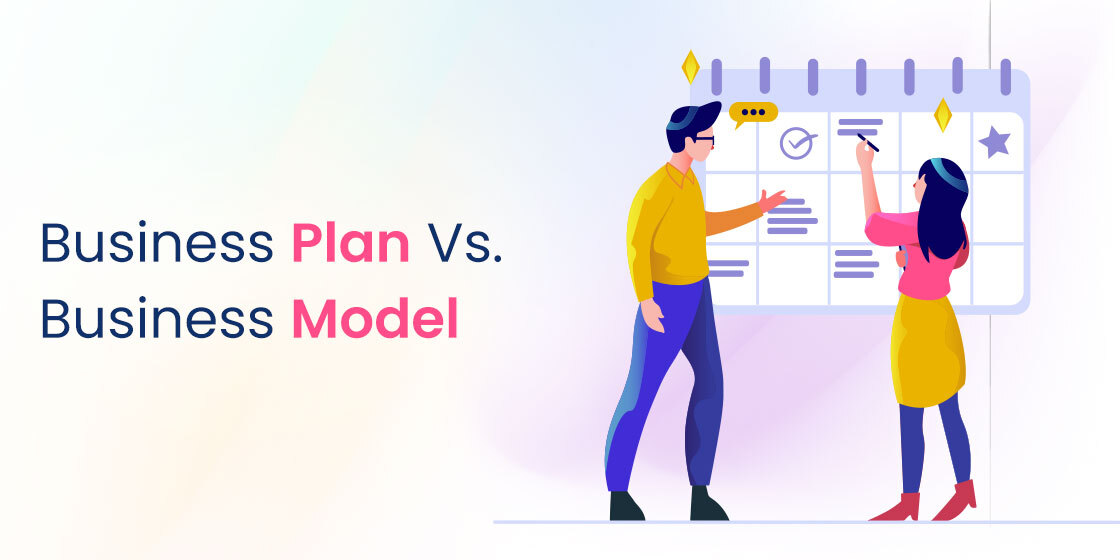Table Of Content
Discover What Separates a Business Plan from a Business Model of Your Business
For an entrepreneur or a businessperson, there are many factors to consider when starting a business. One of the elements foremost on their list is identifying the right customers, and finding the right strategy that helps them reach out to those customers. This entire exercise and several others taken by a businessperson are all designed to find ways to generate the desired revenue.
So, where in all this lies the business plan or business model? While business plan vs. business model does offer several differences, essentially, they are both used as guidelines to create and run a business successfully. So, we can say that in the grand scheme of things, they are both quite important to the success of a business.
Now, as an entrepreneur or a businessperson, you might be wondering – if a business plan and a business model are both useful to a business’s success, and they aren’t the same thing, then how are they different?
Let’s take a look at the differences that define a business plan and a business model distinctly, and understand how each of these two types of documents plays a role in the success of a company like a software outsourcing company.
Business Plan – What is it?

Let’s start with the business plan. Essentially, a business plan is a detailed formal document that outlines the strategy/s a specific business will use to generate revenue and achieve success. It outlines the goals of the business, along with the methodology and timelines designated to achieve those goals.
For a business owner, it acts as a roadmap that directs them how to succeed as a company, financially, with the required strategies and plans outlined clearly in it. That is why, a business plan often contains:
- Background of the business/company
- A detailed and structured marketing plan
- A distinct and targeted sales plan
- A well-defined organizational structure with the hierarchies addressed properly
- The working of the individual offices/departments
- A report of the existing finances and other assets
- A plan on attracting and inviting investors
- A framework to achieve the desired outcomes and milestones
- The details of the target market
- Risks and assumptions for your business and how you plan to overcome them
These are just some of the major points that are covered in detail in a company’s business plan. So if all of that is covered in a business plan, what role does the business model play? Let’s find out.
What is a Business Model?

A business model can be considered a framework that is used to run a business successfully. It addresses a variety of factors, both internal and external. These factors include social, economic, cultural, and a variety of other conditions that could affect the outcome of your efforts.
As a business framework, it defines processes and strategy for various business elements, such as the target customers, financing, offered value, sources of revenue, and much more. Essentially, we can say that it defines how the company is going to earn a profit.
Now, it does not mean that the profit would always be calculated in terms of monetary value. A company may use different business models at different times of its lifecycle. For example, an IT project outsourcing company in the beginning of its life may follow a growth-oriented business model. However, a few years down the line, and once they have a loyal following, they may start to follow a revenue-oriented business model.
What Constitutes a Business Model?
No matter the type of business model you follow, it should have three elements necessary to consider it a successful business model. A well-designed strategic model for a business addresses the following elements.
Should be Sustainable
Sustainability is the crux that defines how successful any framework or model is going to be, whether it is for a business, or for anything else. There are a number of factors that can affect the sustainability or the viability of your business model.
- Competitive advantage is a great driver for sustainability. If your business model has a competitive advantage, then chances are that it will be sustainable.
- Innovation is another great driver for sustainability, which allows your business to grow steadily.
- Pitfall assessment can help you identify and navigate potential pitfalls for a more successful business.
- Scalability can also affect a business’s sustainability, as it affects how easily a company can scale back or exit the market if the business requirements prove difficult to achieve due to change in the environmental factors.
Should Mention Monetization Strategies
A monetization plan in your business model is necessary as it identifies and outlines how your business would earn its revenue. And as every business in the world is ultimately there to earn a profit, a well-defined monetization strategy can help your business model succeed.
It usually consists of two elements:
- A profit strategy defines how the business would generate a revenue stream, a necessary task that allows you to know where and how your money comes.
- A series of marketing and sales plans and frameworks that help your company set up and maintain the revenues streams outlined in your profit strategy.
Relevance and Alignment With the Organization
Relevance of your business model is dependent on how well it aligns with your organization and its expectations. It doesn’t matter how good a marketing or production plan is, if it fails to adhere to the business guidelines of your organization. This alignment is usually checked by:
- Your business’s unique value proposition. Basically, how well does your offering provide potential customers with the value they need?
- How attractive is your offering for potential customers, when compared to the ones created by your competition?
These factors, and many others, are what define the business model. And if you follow the factors above, you too will be able to create and outline a successful business model easily.
Now, let’s take a look at the business plan vs. business model debate, and see how the two are different when compared side by side.
Business Plan vs. Business Model – How are They Different?
When we talk about business plan vs. business model, there is often a lot of confusion as to what each individual item entails. The reason for that is that both of these documents are often used in conjunction, which makes it quite difficult for people to identify the distinctive characteristics of each.
Let’s say there is a service-provider that offers a number of business process outsourcing services, like customer support, technical hiring, and more. We can say that outsourcing is their business model, while the way they outsource is their business plan.
Let’s take a look at how the both of them are different from each other.
| Business Plan | Business Model |
| It defines the structure of a company | It’s the foundation of a company |
| Business plan details how an idea would work, and what is the expected outcome | Business model ideates how the business would earn |
| A business plan can be considered a strategic document for the organization that defines the plan needed to achieve the expected outcome | It showcases how the organization is functioning, generating income, and identifying value for customers |
| Offers additional information needed to understand the business model | Needs business plan if it wants to be successful, as without the needed definition, it wont work. |
Some Popular Business Model Examples

Now that you know the difference between a business plan vs. business model, let’s take a look at a few use cases of popular business models and how you can implement a robust business model for your company.
Production Model
The production business model is one of the most basic forms of business models. To put it simply, the company sells its own products and services, and must meet a benchmark number of sales to make a profit.
For example, let’s take the example of a software development firm. They specialize in creating custom software solutions for their customers, and need to ensure that they are able to fulfill the software project requirements and make a profit while keeping their prices competitive.
Advertising Model
The advertising model is an age-old business model, and relies on creating custom content that appeals to the customers’ sensibilities. That ensures that the customer wants to check out and engage with your content, making it less likely that they will be agitated or annoyed by ads.
Marketing Model
People have always been more partial towards buying items and services recommended by the people they know and trust. Essentially, recommendations are a great way to sell you offerings, if you can manage it.
It also depends on the product or service being sold. Gadgets are some of the most popular items where recommendations and reviews can affect the number of sales. And the multilevel marketing model is what helps this type of business thrive.
Franchise Model
The franchise business model is one of the oldest still being used nowadays. Essentially, you sell the rights to use your business name and symbol to someone who will use the goodwill they embody to sell products.
This business model is quite popular in the food business, where restaurants offering perks for businesspeople interested in franchising their business. This allows them better, and quicker reach to a larger pool of customers.
Affiliate Model
Affiliate business model is often found related to the advertising model. However, it is mostly used online, and links to pieces of content that are designed as advertisements, but made to look like they are adding value. Basically, we can say that they are the type of advertising that also cares for the needs of the readers, and offers them something of value in exchange for advertising products to them.
Different types of websites, especially the ones who offer digital services including marketing and branding services, often offer the affiliate-marketing model to promote the offerings of their customers.
Conclusion
In short, the business plan vs. business model debate has a lot of merit, and requires a deeper understanding of the roles that each document plays in the success of a business. Therefore, when you start out in creating your own company, you need to know what goes into each document. And that is easily possible if you understand the differences described above.
FAQs
| What comes first, a business plan or a business model? Essentially, a business model comes first, after which we can offer the details of the model in the business plan. |
| Why are business models replacing business plans? Smaller businesses or startups are nowadays preferring business models over business plans, as they offer more room for interpretation and growth compared to business plans. |
| What are the popular types of business models? Some of the most popular types of business models include: – Business-to-business (B2B) – Business-to-consumer (B2C) – Subscription model – On-demand model |
Empower your digital initiatives with BariTechSol, a premier custom software development company. Our skilled team tailors cutting-edge solutions to your unique needs. Elevate your tech experience and stay ahead in the digital realm. Partner with BaritechSol and code the success of your next big idea.


